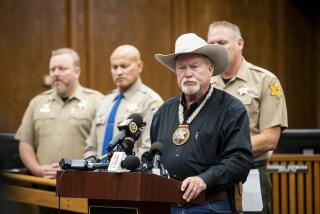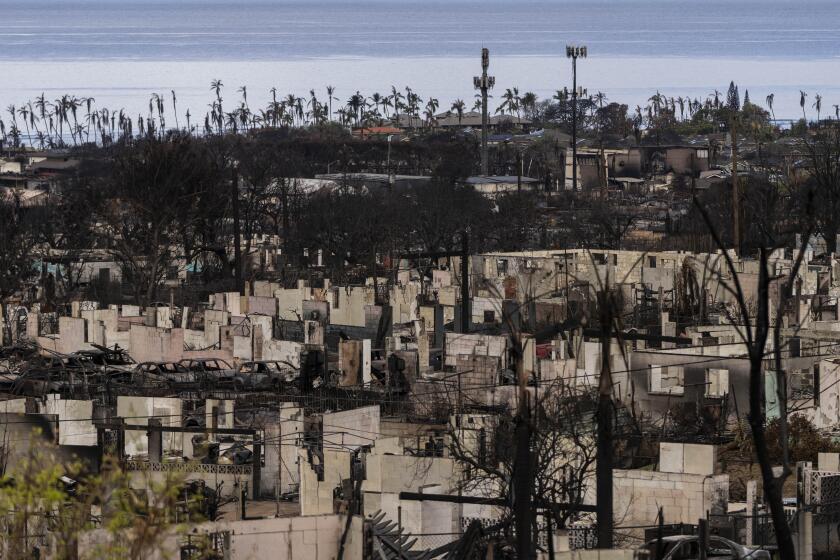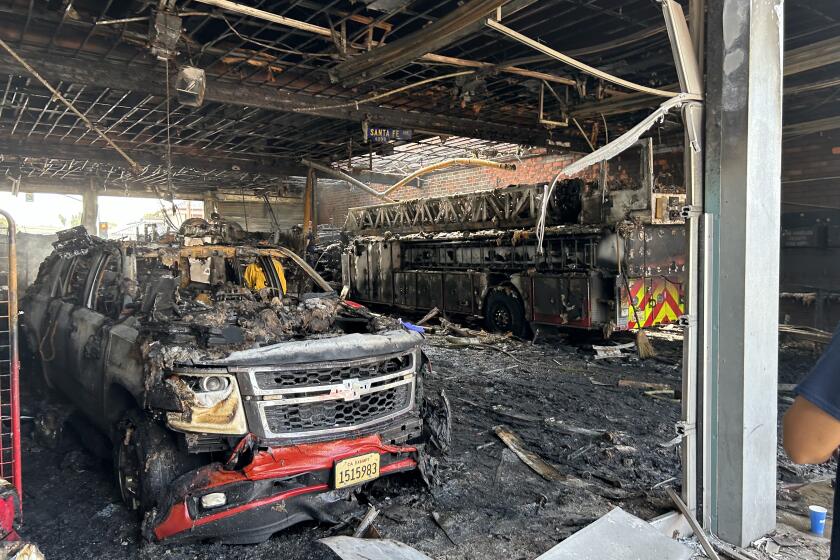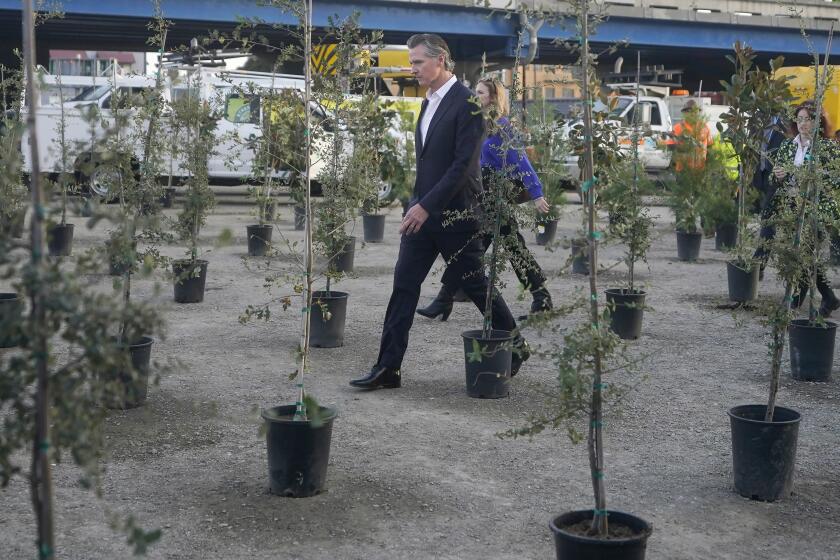ARE WE SUNK?
Even as the devastating wildfires smoldered in Southern California, some homeowners’ concerns already had shifted to another threat: landslides.
Charred hillsides stripped of vegetation can’t hold water. So, residents lucky enough to escape the fires still could see their homes fall victim to a torrent of soil, rocks and mud once the winter rains arrive.
What many of them may not know is that most homeowner insurance policies don’t cover landslides, mudslides or sinkholes.
Just last month, this dismal reality hit home for La Jolla residents whose houses were destroyed or damaged in a massive landslide in the Mount Soledad neighborhood.
Those who own homes in slide-prone areas “need to realize that insurance will not cover this peril,” said Tully Lehman, communications specialist with the Insurance Information Network of California. “Because of that, it may be necessary for the homeowner to obtain a loan to rebuild or create a savings account earmarked for any slide issues.”
It’s a problem that has started to receive notice on a national level. A bill in the House that is gaining momentum would provide insurance coverage for landslides and other disasters. And last month, a Pennsylvania legislator concerned about damage from heavy rains and mining-related earth movement introduced a measure to create a landslide insurance program for state residents. If it succeeds, it would be the first of its kind in the nation. The program would not only offer property owners coverage, but also would provide loans and grants to help residents with repairs.
In California, there is another avenue that few homeowners -- and surprisingly few insurance agents -- seem to be aware of. Property owners can buy coverage specifically for landslides through AmWINS Insurance Brokerage of California, which is backed by Lloyd’s of London.
George Orr, senior vice president of the company, said his biggest frustration is that agents routinely tell clients that landslide insurance isn’t available.
AmWINS, one of the best known of the few companies nationwide that offer such coverage, has sold the policies in California since 1998 and now has about 2,000 to 3,000 property owners on board. The company sells landslide coverage in 23 states and has written more than 10,000 home policies.
It’s not cheap, and not everyone can get it.
For a home valued at $350,000, the annual cost is about $1,000. For a $500,000 home, it’s $1,650; for $1 million, $3,300. And that doesn’t include inspection fees and other charges.
The policy covers the house, contents, garage, outbuildings and loss of use. It doesn’t cover the land, driveway, swimming pool or fences. Coverage is limited to $5 million for residential and commercial properties. The deductible is generally 5% of the structure’s value.
Between 60% and 85% of the policies the company writes nationally are for hillside properties, Orr said. “We won’t turn down a risk in a known hazard area.”
However, the company does turn down about 16% of applicants. “The odds go up as the area incurs more known and/or recent events,” he said.
The company has clients in Pacific Palisades, Malibu, Santa Barbara, Laguna Beach -- pricey seaside spots that are not strangers to landslide activity. The insurer paid $3 million in 2005 to a Beverly Hills plastic surgeon for landslide damage to his property. Another policy holder lives 1 1/2 miles from the recent La Jolla landslide.
It was news to La Jolla resident Jeanne Sweig that landslide insurance even exists. The 78-year-old woman fled her house on Mount Soledad on Oct. 3 when the earth gave way. Her home escaped damage, although it was only 50 yards from others that didn’t.
Sweig bought her home in the late 1960s and says she was later assured by geologists that despite some cosmetic cracking “the house was not going anywhere.” She didn’t worry about a landslide, although she never assumed insurance would cover her in the event of one.
Would she get coverage now? Nope; it’s too costly. She dropped her earthquake insurance when the premium went over $300 a year. (The deductible under the California Earthquake Authority is as high as 15% of the home’s insured value.)
No profit in it
So why isn’t landslide insurance readily available at a more affordable price?
The industry says it just isn’t profitable.
“There’s no real market for it,” said David Russell, associate professor of insurance and finance at Cal State Northridge. “So few people live on a slope of that degree that they feel like they need it. . . . Only people who can afford it and need it would buy it. You end up with a pool of extremely high risk.”
Russell, who wrote a book about insurance called “It’s a Disaster: The Money and Politics That Follow Earthquakes, Hurricanes and Other Catastrophic Losses,” said the issue raises many questions: “Should the insurance company subsidize someone to live in a place with a beautiful view? Should the government subsidize it?”
The idea of a national catastrophe insurance program has been kicked around in Congress since Hurricane Andrew swept through Florida in 1992, drawing resistance from people in regions of the country who feel they are less subject to disaster.
But such a program, called the Homeowners Defense Act, cleared the House Financial Services Committee in late September. Introduced by Florida Reps. Ron Klein and Tim Mahoney, both Democrats, it would provide an avenue for homeowners in risky areas to get disaster coverage.
Under the bill, state-sponsored insurance programs could opt to join other states to pool their risk, which would be transferred to the private market through catastrophe bonds and reinsurance contracts. After a disaster, federal loans would be available in case the state couldn’t cover claims.
Not a bailout
Adrienne Elrod, spokeswoman for Klein, said that the bill wasn’t a federal bailout and that it would help stabilize the insurance industry.
“A lot of insurance companies have problems covering folks in high-risk areas,” she said.
“They either raise [the cost] to unbelievable rates or drop people altogether. It’s happening across the country.”
The recent California wildfires, she said, underscore the need for such a plan.
California Insurance Commissioner Steve Poizner feels that the bill has promise but that it needs modification, according to Deputy Press Secretary Molly DeFrank.
It would primarily benefit Florida, but his office and others, including that of U.S. Sen. Dianne Feinstein, are working to change it to increase the benefits for California, she said.
If the bill becomes law, such coverage would still be a ways off.
Where does that leave homeowners and prospective home buyers now? Take the case of Adriana King, who bought her 3,700-square-foot house on La Jolla’s Mount Soledad in February for $1.8 million.
King thought she knew what she was doing. She read the natural-hazard disclosure report that the sellers were required to provide under a state law in place since 1998. She knew she was in a seismic hazard zone, but so is much of the San Diego area. What the report isn’t required to disclose is previous landslides in the area -- of which there had been several.
“The report is not specific,” King said. Plus, it is just one of a mound of documents buyers are deluged with when they close a deal.
And she was taken with the house, built in 2005. With its panoramic views of the city, it seemed set back far enough from the slope, which was bolstered by a retaining wall.
“It seemed secure,” King said.
In fact, the house didn’t budge during the recent landslide. However, King, her husband and three children were forced to evacuate the house.
It was a nerve-jangling 24 hours before they were cleared to return.
Chuck Piro, vice president of Disclosure Source, one of the companies that prepares hazard disclosure reports for a fee -- his is $79 -- said the legislation requiring the reports needs to be re-examined.
“The law is vague at best,” he said. The reports indicate whether a property is in a mapped area where there is potential for a landslide. If you look at hazard maps, he said, “all of La Jolla is in earthquake and landslide hazard zones. . . . That doesn’t mean it’s imminent.”
The local angle
The disclosure law calls for state and federal maps to be used, he said, and doesn’t provide enough information. Locally produced maps should be a must as well, Piro said.
Should the reports disclose past landslides? “That’s too much of a gray area,” said Piro, who questioned how it could be done because landslides have occurred throughout history. “How far back do you go?”
But a murkier question is who would get this information -- the buyer of a house a quarter of a mile away? A mile? Five miles? “Where do you draw the line?” he asked.
If the possibility of a landslide or mudslide doesn’t turn you off to buying that hillside property, Lehman, of the Insurance Information Network of California, has some advice before you close the deal.
Beyond a home inspection, hire a soils engineer to determine the potential for a slide. And find out about previous landslides in the area.
“Make certain you do your homework,” he said.
--
Jane Hulse can be reached at janehulse@yahoo.com.
--
Begin text of infobox
Got coverage?
People are often surprised to learn what their insurance policies will or won’t pay for. Here is what they typically include and exclude:
*--* Type of insurance What’s covered What ‘s not Homeowner’s Fire, lightning, Floo windstorm, hail, ds, explosions, riots, eart aircraft and vehicle hqua crashes into the kes, home, smoke, land vandalism and theft slid es, muds lide s or sink hole s Flood (as it relates to earth movement) Mudflows (defined by Muds FEMA as a river of lide liquid mud that s moves onto dry land) (con side red more soli d than a flow ; occu r when a dry or wet mass of eart h or rock move s down hill ) *--*
Here are other websites that may be helpful:
* Insurance Information Network of California: www.iinc.org.
* Federal Emergency Management Agency: www.fema.gov.
* National Landslide Information Center: landslides.cr.usgs.gov/nlic/.
-- Jane Hulse
Sources: Insurance Information Network of California, FEMA
More to Read
Start your day right
Sign up for Essential California for news, features and recommendations from the L.A. Times and beyond in your inbox six days a week.
You may occasionally receive promotional content from the Los Angeles Times.






